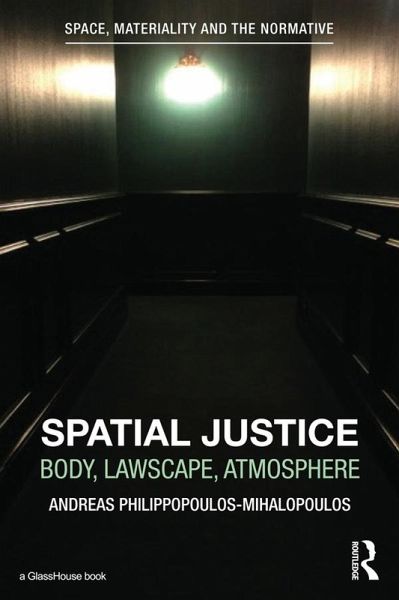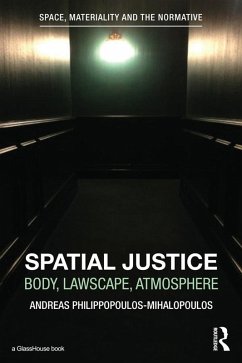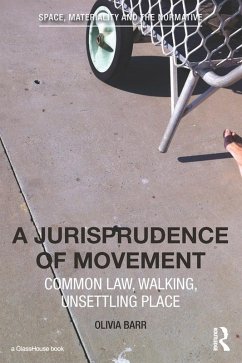
Spatial Justice (eBook, PDF)
Body, Lawscape, Atmosphere
Versandkostenfrei!
Sofort per Download lieferbar
49,95 €
inkl. MwSt.
Weitere Ausgaben:

PAYBACK Punkte
25 °P sammeln!
There can be no justice that is not spatial. Against a recent tendency to despatialise law, matter, bodies and even space itself, this book insists on spatialising them, arguing that there can be neither law nor justice that are not articulated through and in space.Spatial Justice presents a new theory and a radical application of the material connection between space - in the geographical as well as sociological and philosophical sense - and the law - in the broadest sense that includes written and oral law, but also embodied social and political norms. More specifically, it argues that spati...
There can be no justice that is not spatial. Against a recent tendency to despatialise law, matter, bodies and even space itself, this book insists on spatialising them, arguing that there can be neither law nor justice that are not articulated through and in space.
Spatial Justice presents a new theory and a radical application of the material connection between space - in the geographical as well as sociological and philosophical sense - and the law - in the broadest sense that includes written and oral law, but also embodied social and political norms. More specifically, it argues that spatial justice is the struggle of various bodies - human, natural, non-organic, technological - to occupy a certain space at a certain time. Seen in this way, spatial justice is the most radical offspring of the spatial turn, since, as this book demonstrates, spatial justice can be found in the core of most contemporary legal and political issues - issues such as geopolitical conflicts, environmental issues, animality, colonisation, droning, the cyberspace and so on. In order to ague this, the book employs the lawscape, as the tautology between law and space, and the concept of atmosphere in its geological, political, aesthetic, legal and biological dimension.
Written by a leading theorist in the area, Spatial Justice: Body, Lawscape, Atmosphere forges a new interdisciplinary understanding of space and law, while offering a fresh approach to current geopolitical, spatiolegal and ecological issues.
Spatial Justice presents a new theory and a radical application of the material connection between space - in the geographical as well as sociological and philosophical sense - and the law - in the broadest sense that includes written and oral law, but also embodied social and political norms. More specifically, it argues that spatial justice is the struggle of various bodies - human, natural, non-organic, technological - to occupy a certain space at a certain time. Seen in this way, spatial justice is the most radical offspring of the spatial turn, since, as this book demonstrates, spatial justice can be found in the core of most contemporary legal and political issues - issues such as geopolitical conflicts, environmental issues, animality, colonisation, droning, the cyberspace and so on. In order to ague this, the book employs the lawscape, as the tautology between law and space, and the concept of atmosphere in its geological, political, aesthetic, legal and biological dimension.
Written by a leading theorist in the area, Spatial Justice: Body, Lawscape, Atmosphere forges a new interdisciplinary understanding of space and law, while offering a fresh approach to current geopolitical, spatiolegal and ecological issues.
Dieser Download kann aus rechtlichen Gründen nur mit Rechnungsadresse in A, B, BG, CY, CZ, D, DK, EW, E, FIN, F, GR, HR, H, IRL, I, LT, L, LR, M, NL, PL, P, R, S, SLO, SK ausgeliefert werden.













